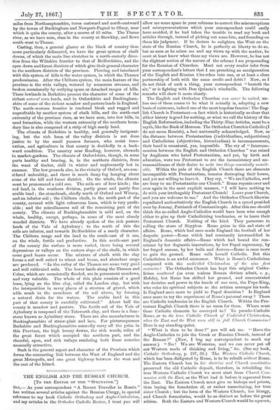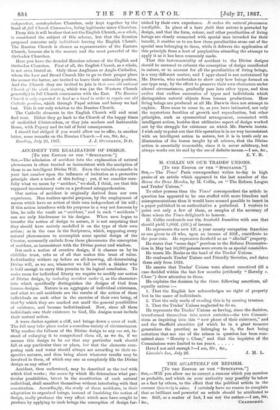THE ENGLISH AND THE RUSSIAN CHURCH. [TO THE EDITOR OF
THE "SPECTATOR."] SIR,- As your correspondent " A. Recent Traveller in Russia " has written several articles against the Russian Clergy, in special reference to my book Catholic Orthodoxy and Anglo-Catholicism, and my articles in the Orthodox Catholic Review, I trust you will
allow me some space in your columns to correct the misconceptions and misrepresentations which your correspondent could easily have avoided, if he had taken the trouble to read my book and articles through, instead of picking out some bits, and founding on them his judgment. If he desires to enlighten the West on the state of the Russian Church, he is perfectly at liberty to do so, but as soon as he mixes me and my views up with the matter, he must at least know what these my views are. However, he has not the slightest notion of the nature of the scheme I am propounding for the Reunion of Churches. Must not every reader infer from your correspondent's letters that I am preaching an amalgamation of the English and Russian Churches into one, or at least a close partnership of both with the same credit and debit? Now, as I do not think of such a thing, your correspondent " beateth the air," or is fighting with Don Quixote's windmills. The following remarks will show it more clearly.
The English and Orthodox Churches can never be united, un- less one of them ceases to be what it actually is, adopting a new basis of existence, indeed one of the most hopeless fancies! The Eng- lish Church is Protestant—a fact which is historically so clear that either history is good for nothing, or what we call the history of the English Reformation, including the Thirty-Nine Articles, must be a myth, like the Book of Mormon. The Orthodox Church is Catholic (I do not mean Romish), a fact universally acknowledged. Now, as the distance between Protestantism (individualism, subjectivism) and Catholicism (objectivism, historicalism) is incommensurate, their bond is unnatural, yea, impossible. The cry of " Intercom- munion between the English and Orthodox Churches " was raised by Anglicans who hated Protestantism, and yet, by birth and education, were too Protestant to see the inconsistency and un- reasonableness of their desire to unite two things essentially ununit- able. Within the pale of the English Church there are elements incompatible with Protestantism, inmates destroying their house, and yet not willing to leave it. They cry, " We are Catholics, and are busy to un-Protestantize our Church." Rome repeats over and over again in the most explicit manner, " I will have nothing to do with your irrefragably Protestant Church! Leave your Church, and you are welcome to me." And the Orthodox Church likewise repudiated authoritatively the English Church in a synod presided over by Jeremy, Patriarch of Constantinople. After this one should think the so-called Anglo-Catholics would have been wise enough either to give up their Catholicizing tendencies, or to leave their Protestant Church. Nothing of the kind. They persevere in rolling the stone of Sisyphus. Rome gains in this sad state of affairs. Rome, which had once made England the football of her despotic power—Rome which had constantly intermeddled in England's domestic affairs—Rome which had bound the con- science by her dogmatic innovations, by her Papal supremacy, by her forged canons, by her bulls and decrees—Rome is once more to gain the ground. Rome calls herself Catholic. But this Catholicism is an awful misnomer. What is Rome's Catholicism compared with the undivided Christendom of the nine first centuries? The Orthodox Church has kept this original Catho- licism unaltered (as even zealous Roman divines admit, e. g., Hefele), but Rome has shifted her ground, and concentrated her doctrine and power in the hands of one man, the Pope-King, who rules his spiritual subjects as the artisan manages his tools. Is England once more to yield to Papal dominion ? Is England once more to try the experiment of Rome's paternal sway ? There are Catholic tendencies in the English Church. Within the 1?ro- testant English Church there is no room for them. Where must these Catholic elements be conveyed to? To pseudo-Catholic Rome, or to the true Catholic Church of Undivided Christendom, when the East and the West were still in full Church Communion? Here is my standing-point.
" What is then to be done ?" you will ask me. " Have the Anglo-Catholics to join the Greek or Russian Church, instead of the Roman ?" (Now, I beg my correspondent to mark my answer.) " No ! We are Westerns, and we can never put off our Western mode of thinking and living," &c. (See my book, Catholic Orthodoxy, p. 197, 39.) The Western Catholic Church, which has been disfigured by Rome, is to be rebuilt without Rome. The Eastern Church has in her doctrine and Church constitution preserved the old Catholic deposit, therefore, in rebuilding the true Western Catholic Church we must start from Church Com- munion with the East, as the West had it before it separated from the East. The Eastern Church must give us bishops and priests, thus laying the foundation of, or rather resuscitating, her true sister Church ; but the form of the Western Church, her liturgy, and Church formularies, would be as distinct as before the great schism. Both the Eastern and Western Church would be separate,
independent, autokephalous Churches, only kept together by the bond of fall Church Communion, being legitimate sister Churches. From this it will be clear that not the English Church, as a whole, is considered the subject of this scheme, but that the Reunion proposed concerns only individuals leaving the English Church. The Russian Church is chosen as representative of the Eastern Church, because she is the nearest and the most powerful of the Orthodox Churches.
Here you have the dreaded Reunion scheme of the English and Orthodox Churches. First of all, the English Church, as a whole, is not even hinted at. Only those Anglicans or Anglo-Catholics, whom the Low and Broad Church like to go to their proper place the sooner the better, are invited to leave their untenable position. And the Church they are invited to join is their own old national Church of the ninth century, which was (as the Western Church generally) in full Church communion with the East. The Russian Church is only requested to lend as a hand in order to regain our old Catholic position, which through Papal schism and heresy we had lost. This is our only relation to the Russian Church.
The Catholic elements in the English Church will and must find vent. Either they go back to the Church of the happy times of undivided Christendom, or they join modern and fashionable Rome, with Papacy and its tail of fatal consequences.
I should feel obliged if you would allow me to offer, in another letter, some remarks on the Russian Church.—I am, Sir, &c.,































 Previous page
Previous page